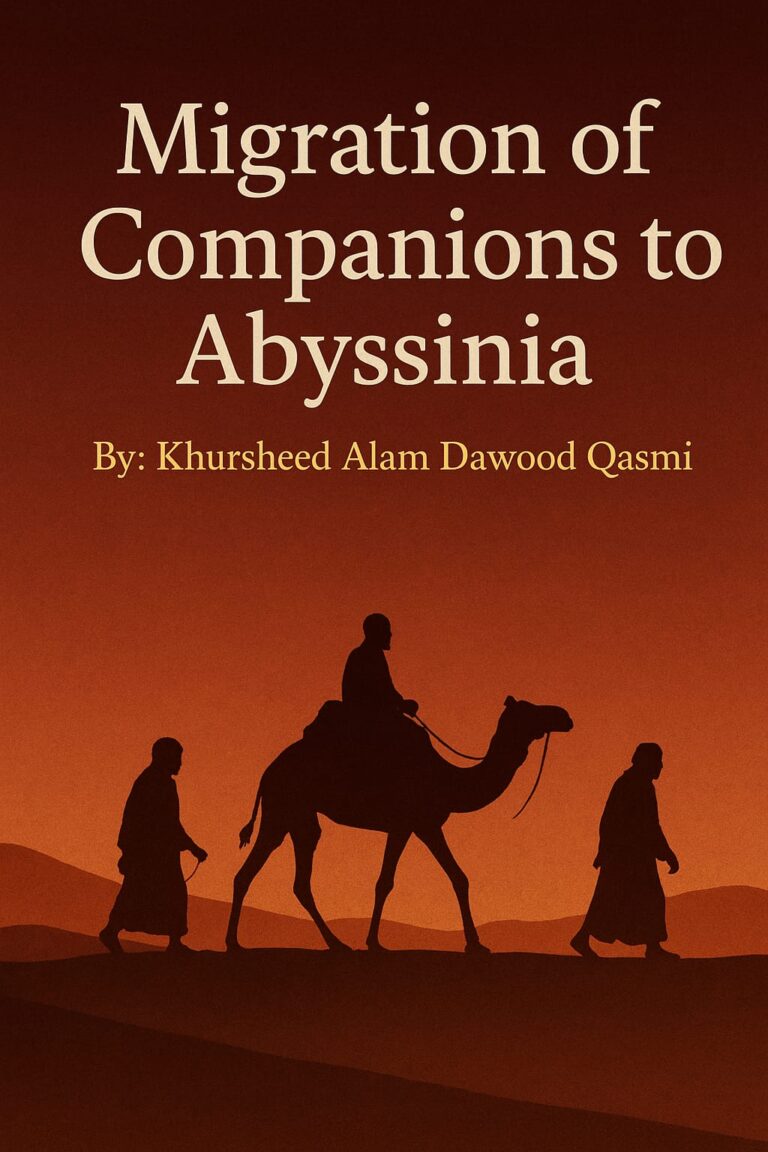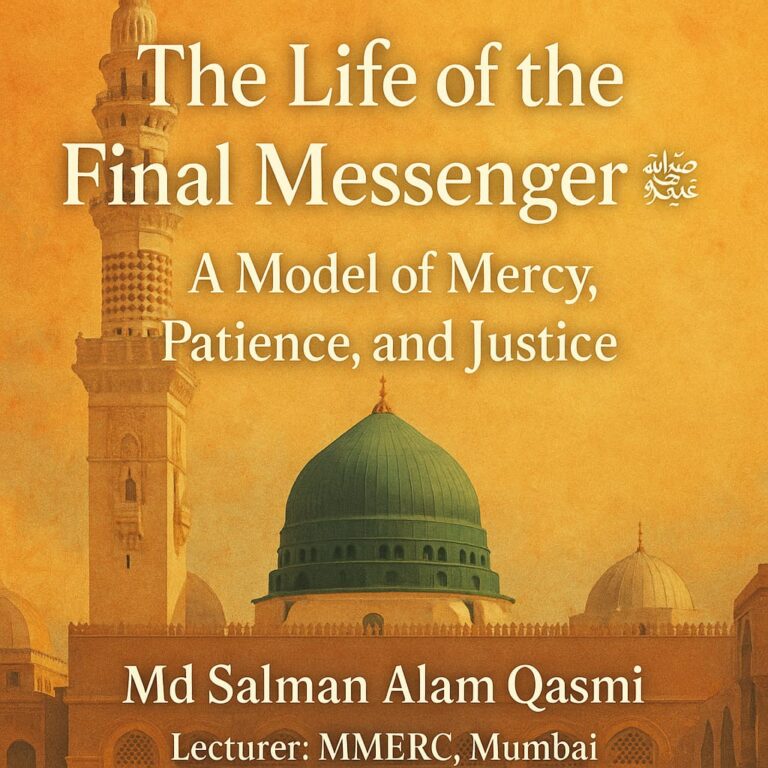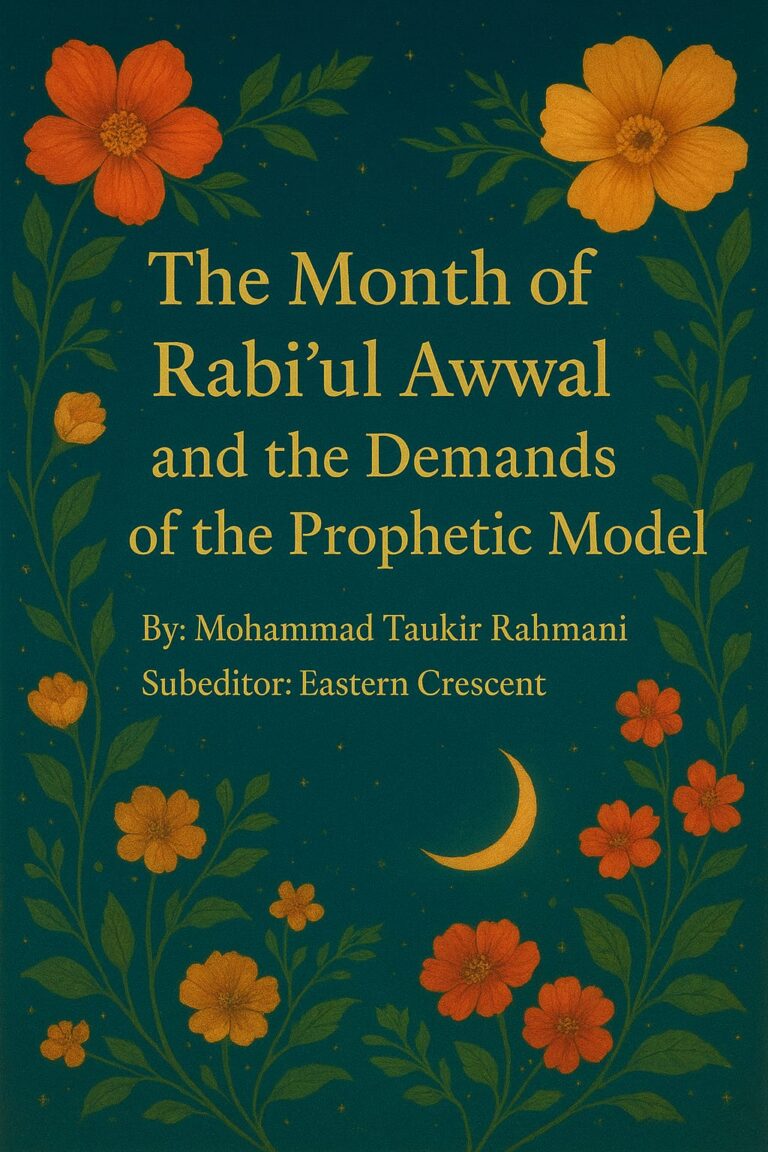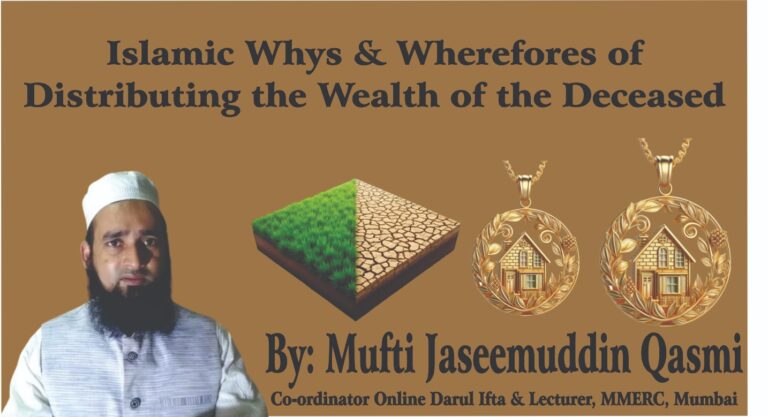
Love for the Prophet Muhammad (ﷺ)
Love for the Prophet Muhammad (ﷺ)
Dr. Mohd Sayeed Anwar
ZHIIS, JMI, India
Love is an innate human emotion that inspires in the heart a deep sense of attachment, affection, and longing for closeness with another. Broadly speaking, it can be divided into three primary forms: material love, natural love, and true love. Each of these carries its own expansive meaning and possesses a distinct scope of application.
Material Love
Attraction, charm, inclination, and desire—these are words intrinsically linked with every moment, every breath, and every sensation of human life. Whether it is the sight of something visually captivating, the delight of a savoury dish or refreshing drink, the soothing cadence of melodious sounds reaching the ear, the delicate softness of a tender touch, or the subtle fragrance that penetrates the heart, all such experiences reveal the alluring nature of worldly beauty. Through the five senses—sight, hearing, smell, taste, and touch—human beings perceive the splendour of the universe and derive meaning from the experience of existence.
The inclinations that arise from these sensory windows often prove deceptive, lasting only for a fleeting moment, though at times they also nurture feelings of affection. The love that stems from such impulses, however, is generally material in nature and therefore transient. The Qur’an makes this clear:
And the life of this world is nothing but the enjoyment of delusion.(Al-Qur’an, Surah al-Hadid 57:20)

In other words, to forget the true purpose of creation and lose oneself in the fleeting attractions of this world—becoming enslaved to materiality—is nothing but deception.
Material love, then, is ultimately bound to perish, for it is grounded in the temporary pleasures of the senses rather than in enduring truth. It is a love that gratifies momentarily but fails to uplift the spirit or bestow lasting meaning upon human life.
Natural Love
Viewed from a different perspective, love is a natural emotion that engenders in the human heart a profound attachment, affection, and desire for closeness with a person, object, or idea. It is not merely a superficial attraction or a fleeting inclination; rather, it represents a heartfelt bond founded upon selflessness, sacrifice, loyalty, and sincerity. In this form of love, the heart takes precedence over reason, guiding actions and feelings with genuine emotional depth. For this reason, we may aptly refer to it as natural love.
A prominent example of natural love can be seen in the affection that parents feel for their children. Such love is rooted in nature, guided by innate compassion, mercy, and gentleness. Similarly, the love children feel for their parents is divinely inspired (min Allah), arising fundamentally from blood relations. In both directions, the foundation of this love lies in natural instinct (fitrah) and innate disposition (jiblah).
Moreover, natural love encompasses not only biological ties but also qualities such as tenderness, mercy, and empathy. Thus, it represents a harmonious convergence of compassion and mercy with instinct and disposition. It is enduring and selfless in its essence, seeking the well-being of the beloved even without expectation of personal gain. Unlike material love, which is primarily concerned with sensory satisfaction, natural love is deeper, ethical, and relational, reflecting a higher level of emotional and spiritual engagement.
True Love
The highest form of love is that in which the lover places the satisfaction and pleasure of the beloved above his or her own. Within the Islamic framework, the supreme example of such love is the love for Allah and His Messenger ﷺ. This love demands that a person prioritizes the commands of Allah and His Prophet ﷺ over personal desires, interests, and worldly attachments. Allah Himself, addressing the Prophet ﷺ, states:
Say: If you love Allah, follow me; Allah will love you. (Al-Qur’an, Surah Al-Imran 3:31)
This form of love represents the pinnacle of faith (iman) and is considered non-material, true, divinely sanctioned, and enduring. True love is a stable and spiritual state, founded upon sincerity, selflessness, and sacrifice. At its highest degree, it leads a believer to surrender all personal interests for the sake of Allah and His Messenger ﷺ.
The Prophet ﷺ said: “None of you can be a perfect believer until I am more beloved to him than his father, his children, and all of mankind.”(Sahih al-Bukhari, Kitab al-Iman)
Desires of the Self
Material love can also be termed as the manifestation of desires of the self (nafsaniyah). These desires arise from the temporary allure of the five senses and provide fleeting satisfaction, yet they lack lasting spiritual significance. The centre of nafsaniyah is the self—“I” and “my pleasure.”
Countless examples in daily life illustrate this inclination: excessive indulgence in rich foods and beverages, treating luxurious clothing and possessions as ultimate markers of life’s success, performing righteous deeds for the sake of fame rather than sincerity, being captivated by physical beauty, or pursuing wealth through unethical means. Such behaviors may provide temporary gratification but remain devoid of spiritual elevation and enduring meaning.
The Prophet ﷺ warned:
The thing I fear most for you is the following of the desires of the self and prolonged hope. The desire of the self prevents one from truth, and prolonged hope distracts from the Hereafter.(Musnad Ahmad)
This hadith emphasizes that material desire, while offering momentary pleasure, deprives the human soul of truth and spiritual elevation. True success lies in restraining the self and mastering its impulses.
Effects of True Love
True love elevates a person above self-centeredness and immerses them in the pleasure of the beloved. It frees the individual from the shackles of the ego and leads them along the path of sincerity, selflessness, and sacrifice. In practical terms, this manifests as devoted service to parents, selfless efforts for the welfare of others, performing righteous deeds solely for Allah’s pleasure, and prioritizing divine commands over personal interests.
Unlike material love, which is fleeting, true love provides lasting peace, spiritual growth, and a sense of purpose. Its highest manifestation is the love for Allah and His Messenger ﷺ, which transforms every aspect of life into a pursuit of the beloved’s satisfaction. The Prophet ﷺ said:
Whoever truly loves me, Allah will love him.(Sahih Muslim)
Condition of New Generation
In the present era, young men and women find themselves particularly tested between these two forms of love: the fleeting, sensory-driven desires and the enduring, spiritual love that guides towards true purpose. Contemporary youth often chase social media likes and followers, equate expensive brands and fashion with success, label transient relationships and casual friendships as love, or emulate characters from films and television dramas. These behaviors primarily reflect the dominance of nafsaniyah—self-centered desire. While they may bring momentary happiness, they leave the heart devoid of lasting peace, spiritual growth, and a sense of purpose.
Conversely, when young people dedicate their energies to serving their parents, pursuing education and skill development, helping those in need, and striving for the pleasure of Allah and His Messenger ﷺ, they manifest the qualities of true love. Such love liberates an individual from the constraints of the self and leads them along the path of sincerity, sacrifice, and devotion. Unlike fleeting pleasures, it provides enduring tranquility and spiritual elevation.
The highest example of this love is devotion to Allah and His Messenger ﷺ, which enables youth to align every aspect of their lives with the pleasure of the true Beloved. It cultivates a sense of purpose in education, service, and virtuous action, ensuring that worldly engagement does not distract from spiritual growth. Through such love, young people learn to act selflessly, prioritize divine guidance over personal whims, and contribute positively to society, while simultaneously preparing for success in the Hereafter.
Current State of Love for the Prophet ﷺ
Love for the Messenger ﷺ represents the highest and most spiritual state of the heart, positioned at the pinnacle of faith. This love is not limited merely to emotional attachment or reverence; rather, it manifests in a person’s thoughts, actions, ethics, and every aspect of daily life. The foremost requirement of this love is to prioritize the pleasure of the Prophet ﷺ above personal desires, interests, and relationships, and to strive to follow his example in every action. To live one’s life illuminated by love for the Messenger ﷺ means to maintain principles, ethics, and purposefulness even in worldly affairs. For young people, this has practical implications: they must commit to acquiring knowledge and skills diligently, serve their parents and elders faithfully, care for the welfare and needs of others, and approach worship and virtuous deeds with sincerity. In relationships, they are required to practice respect, patience, and justice, making the pleasure of Allah and His Messenger ﷺ the central guiding principle in all matters.
This love refines worldly life because it instils moderation, purposefulness, and ethical conduct in behavior, relationships, and activities. Through it, young people and others can channel their moral, intellectual, and spiritual capacities positively, thereby establishing a strong foundation for success in the Hereafter. In essence, love for the Messenger ﷺ grants tranquility and success in both this world and the next, illuminating life with true meaning and direction.
Demands of Love for the Prophet ﷺ
The love of the Messenger ﷺ has specific demands, without fulfilling which it cannot reach perfection. When love attains its highest degree, it naturally requires selflessness, manifesting in a desire to see, meet, and hear the beloved alone. The lover accepts everything the beloved commands and sacrifices personal comfort for His sake. He abandons personal tastes, desires, and priorities, willing to give his life for the beloved. No act is undertaken that the beloved has forbidden.
The lover emulates the Prophet ﷺ in appearance, conduct, and lifestyle, adopting his manners and demeanor. The one who loves sincerely also loves the Prophet’s companions (Sahabah) and the righteous predecessors (Salihin), and extends love even to the poor and needy, and to all of humanity and Allah’s creation, understanding that the beloved ﷺ loved all of these. The lover’s devotion follows the beloved’s love; it is impossible for the desires of the lover to contradict those of the beloved. If they do, any claim to true love is invalid.
Alas! In reality, much of what is claimed as love for the Messenger ﷺ is superficial. The Prophet ﷺmay desire one course of action, while our desires follow another. His commands may differ from our behavior; his displeasure may be ignored, and his prohibitions disregarded. In short, people may claim love, yet act in ways contrary to the teachings and pleasure of the beloved.

It is important to note that a true lover is never negligent. Love and negligence are entirely distinct. Love agitates, awakens, unsettles, and readies the soul, while negligence fosters complacency. In life, however, many speak of love verbally, yet their external and internal actions reflect disregard. True love demands conformity and alignment with the beloved; it cannot tolerate opposition. Love seeks proximity and cannot endure distance; it demands selflessness and cannot accommodate selfishness; it seeks harmony and cannot tolerate hostility; it seeks sacrifice and cannot abide stinginess.
Conclusion
Love for the Messenger ﷺ is the highest state of the human soul, one that bestows tranquility and purpose upon life. It is not confined merely to devotion or emotional attachment; rather, it is visibly reflected in a person’s actions, ethics, and relationships. True love elevates the individual above personal desires, guiding them along the path of sincere obedience, sacrifice, and selflessness in pursuit of the pleasure of the beloved. In contrast, material or self-centered love is primarily concerned with momentary pleasure and personal gratification.
Through this love, a person serves parents and elders with genuine devotion, sacrifices personal comfort for the welfare of others, performs acts of worship and righteousness with sincerity, and prioritizes the demands of faith over personal inclinations. The Qur’an and Hadith emphasize this distinction clearly: worldly life is merely play and distraction, offering no true tranquility, whereas the one who loves Allah and His Messenger ﷺ sincerely will be loved in return by Allah.
For youth, love for the Prophetﷺ provides guidance to cultivate diligence in knowledge, service, and virtuous action; to maintain patience and justice in relationships; and to establish a strong foundation for success in both this world and the Hereafter. It instils moderation, purposefulness, and ethical conduct, allowing young people to channel their intellectual, moral, and spiritual capacities positively. By embracing this love, life is illuminated with authentic meaning, and the human heart finds lasting peace, contentment, and fulfilment.
In conclusion, love for the Messenger ﷺ is transformative. It refines character, elevates the spirit, and ensures that every action and thought is aligned with the pleasure of the beloved. It teaches that true success lies not in the transient pleasures of material existence but in sincere devotion, selflessness, and the pursuit of divine and prophetic guidance. Through this love, individuals achieve harmony in their worldly and spiritual lives, attaining the ultimate goal of contentment and closeness to Allah and His Messenger ﷺ.
You May Also Like
 Prophetic Injunctions
Prophetic InjunctionsMigration of Companions to Abyssinia
Migration of Companions to Abyssinia By: Khursheed Alam Dawood Qasmi Opening Words: "Hijrah" is...
 Prophetic Injunctions
Prophetic InjunctionsMigration of the Prophet Muhammad (saws) to Madinah and Its Reward
Migration of the Prophet Muhammad (saws) to Madinah and Its Reward By: Khursheed Alam...
 Prophetic Injunctions
Prophetic Injunctions“The Life of the Final Messenger ﷺ: A Model of Mercy, Patience, and Justice”
“The Life of the Final Messenger ﷺ: A Model of Mercy, Patience, and Justice”...
 Prophetic Injunctions
Prophetic InjunctionsMoral Values in Islam
Moral Values in Islam By: Mohammad Taukir Rahmani Subeditor: Eastern Crescent Moral values in...
 Prophetic Injunctions
Prophetic InjunctionsThe Month of Rabi‘ul Awwal and the Demands of the Prophetic Model
The Month of Rabi‘ul Awwal and the Demands of the Prophetic Model By Mohammad...
 Prophetic Injunctions
Prophetic InjunctionsIslamic Whys & Wherefores of Distributing the Wealth of the Deceased
Islamic Whys & Wherefores of Distributing the Wealth of the Deceased By: Mufti Jaseemuddin...

Comments (0)
Leave a Comment